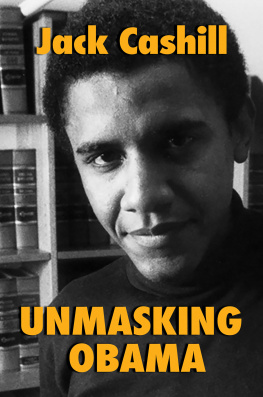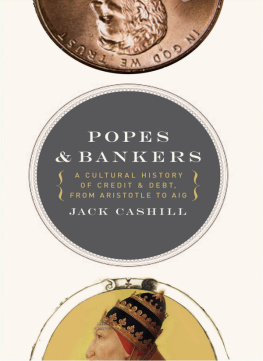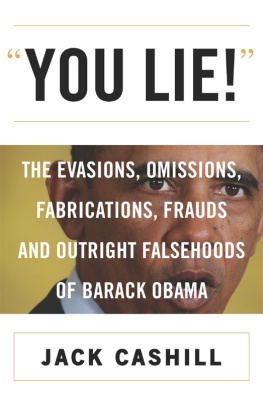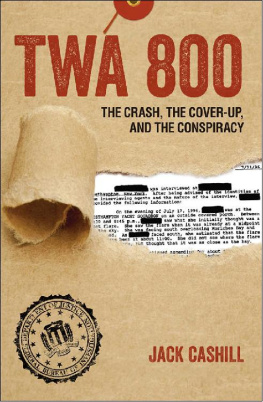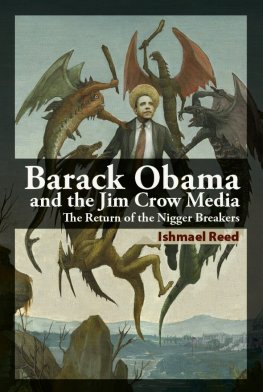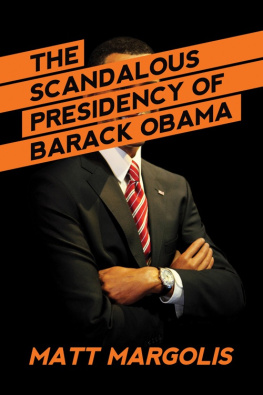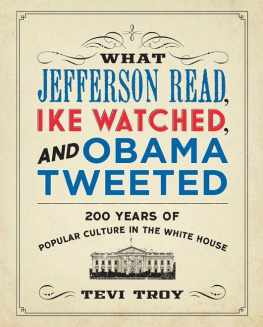A POST HILL PRESS BOOK
ISBN: 978-1-64293-445-8
ISBN (eBook): 978-1-64293-446-5
Unmasking Obama:
The Fight to Tell the True Story of a Failed Presidency
2020 by Jack Cashill
All Rights Reserved
Cover design by Joel Gilbert
No part of this book may be reproduced, stored in a retrieval system, or transmitted by any means without the written permission of the author and publisher.
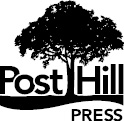
Post Hill Press, LLC
New York Nashville
posthillpress.com
Published in the United States of America
Dedicated to my fell ow Lilliputians
Ta ble of Contents
Prologue:
Michael Cohen Calling
I n the spring of 2011, I received a call from a fellow named Michael Cohen. I did not recognize the name. Nor did I know how Cohen got my cell number. He explained that he was the attorney for Donald TrumpI did recognize that nameand he wanted to know what I knew about Barack O bamas origins.
I would occasionally get calls like this from people of a higher pay grade than mine. Ever since I first started questioning the authorship of Obamas 1995 memoir, Dreams from My Father , I had become something of a conduit between what I have come to think of as the conservative samizdat on the one hand and the responsible righ t on the other.
In Russian, samizdat means self-publishing. During the Soviet era, samizdat referred to the clandestine copying and distribution of literature banned by the state. I use samizdat as shorthand for an alternative conservative media composed of what one Second Amendment blogger aptly called a coalition of willing Lilliputians. In truth, those in the American samizdat run few risks beyond public shaming and perhaps job loss. For American citizen journalists on the right, the gulag is not an active worry, at least not for most of us pace , Jerry Corsiat least not yet.
During the Obama years, the conservative samizdat of blogs, public forums, news aggregators, online publications, talk radio shows, and legal monitors such as Judicial Watch challenged the leftand, occasionally, the responsible rightfor control of the Obama narrative. The internet gave the samizdat unprecedented reportorial power, and social media, Facebook and Twitter most prominently, gave us an ability to distribute our message in ways Soviet dissidents coul d only imagine.
Every Lilliputian who dug up a useful fact and shared it on Facebook enlisted in the coalition of the willing. I got to know many such people. Aiding me in my Ayers-Obama research, for instance, were a half-dozen amateur sleuths from around the world, the two most helpful being the owner of a small Nebraska construction company and the caretaker of a Colorado ski resort. Volunteers did not need a law degree or a PhD. Heck, they didnt need a GED. All they needed was common sense and a nose for the truth. In the only slightly repositioned words of Soviet dissident Vladimir Bukovsky, the struggle was our glasnost versus th eir glasnost.
To keep damaging revelations out of the public square, a counterinsurgency emerged on the left parallel to the samizdat. These well-funded, internet-savvy shock troops had no larger goal than to suppress the information conservatives gathered or hoped to gather. This cohort included media watchdogs such as Media Matters for America, extremist monitors, most notably the Southern Poverty Law Center, various fact-checking operations, and a wide range of left-leaning online publications, some more reckle ss than others.
Watching these activists go about their business, I was reminded of a scene in Ray Bradburys 1951 dystopian sci-fi classic, Fahrenheit 451 . In the way of background, 451 degrees Fahrenheit is the temperature at which paper burns. In the novel, the state employs firemen to burn paper lest the few civilians who care about books avail themselves of information the state does not want them to have. Is it true that long ago firemen put fires out instead of going to start them? a young woman asks her friend. The friend tells her she has been misinformed. Strange, she answers. I heard once that a long time ago houses used to burn by accident and they needed firemen to sto p the flames.
Years ago, young journalists aspired to gather information and spread it. During the Obama era, however, the firemen on the left, like those in Bradburys novel, aspired to destroy inconvenient information before it could spread. At the risk of sounding sexist, I will use the term firemen both in homage to Bradbury and in recognition that men take to this dirty work with more relish than women. Every book burner I identify herein is male.
The firemen had numerous ways of protecting the Obama presidency: defaming opposition journalists, mocking their work, exposing their past sins, trivializing their information, and twisting their facts, among others. At the amateur level, firemen routinely subverted the Wikipedia pages of perceived opponents, wrote one-star book reviews of their work on Amazon, and trolled the comment sections of conservative journals. Former CBS journalist Sharyl Attkisson saw the mission shift up close. After Watergate, she writes, few would have predicted todays dynamic in which some journalists view their job not as questioning the powers that be, but undermining those who report on the po wers that be.
Many of the salaried firemen lived in the same world as their mainstream colleagues. They attended the same universities, hung out in the same bars, and occasionally slept in the same beds. More than a few would leave the firehouse for a desk in a major media newsroom. Among those who made this move was wunderkind Ezra Klein. As a twenty-two-year-old, Klein launched an online meeting space called JournoList in which bloggers on the counterinsurgent left like himself could communicate with major figure s in the media.
In its first reporting on JournoList in March 2009, Politico described it as a site where left-leaning bloggers, political reporters, magazine writers, policy wonks and academics could compare notes and swap story ideas. Despite the many high-profile people who participated, Politico noted ingenuously, JList itself has received almost no attention from the media. This would change, but by that time, the twenty-five-year-old Klein was writing for the W ashington Post.
The firemen took the samizdat more seriously than did many responsible conservative journalists. To the rights tactical disadvantage, its better-connected writers and producers at the National Review , Washington Times , New York Post , Wall Street Journal , the Weekly Standard , and Fox News worked to keep their distance from their irregular allies . There was no JournoList on the right, n othing like it.
Editors at the flagship publication of the responsible right, the National Review , have ventured warily through the media minefield since the publications founding in 1955. This strategic caution became obvious in 1960 when NR condemned the less responsible John Birch Society. Rationalized an editor in an internal memo, We cant afford to jeopardize the grudging status weve earned in the liberal community. Not to deny the dazzling National Review founder William Buckley his due, but Buckley established a modus operandi that has endured to this day throughout the res ponsible right.
During the Obama years, National Review editor Rich Lowry never stopped worrying about the status the liberal community begrudged his publication. As Lowry once noted, Mr. Buckleys first great achievement was to purge the American right of its kooks.

